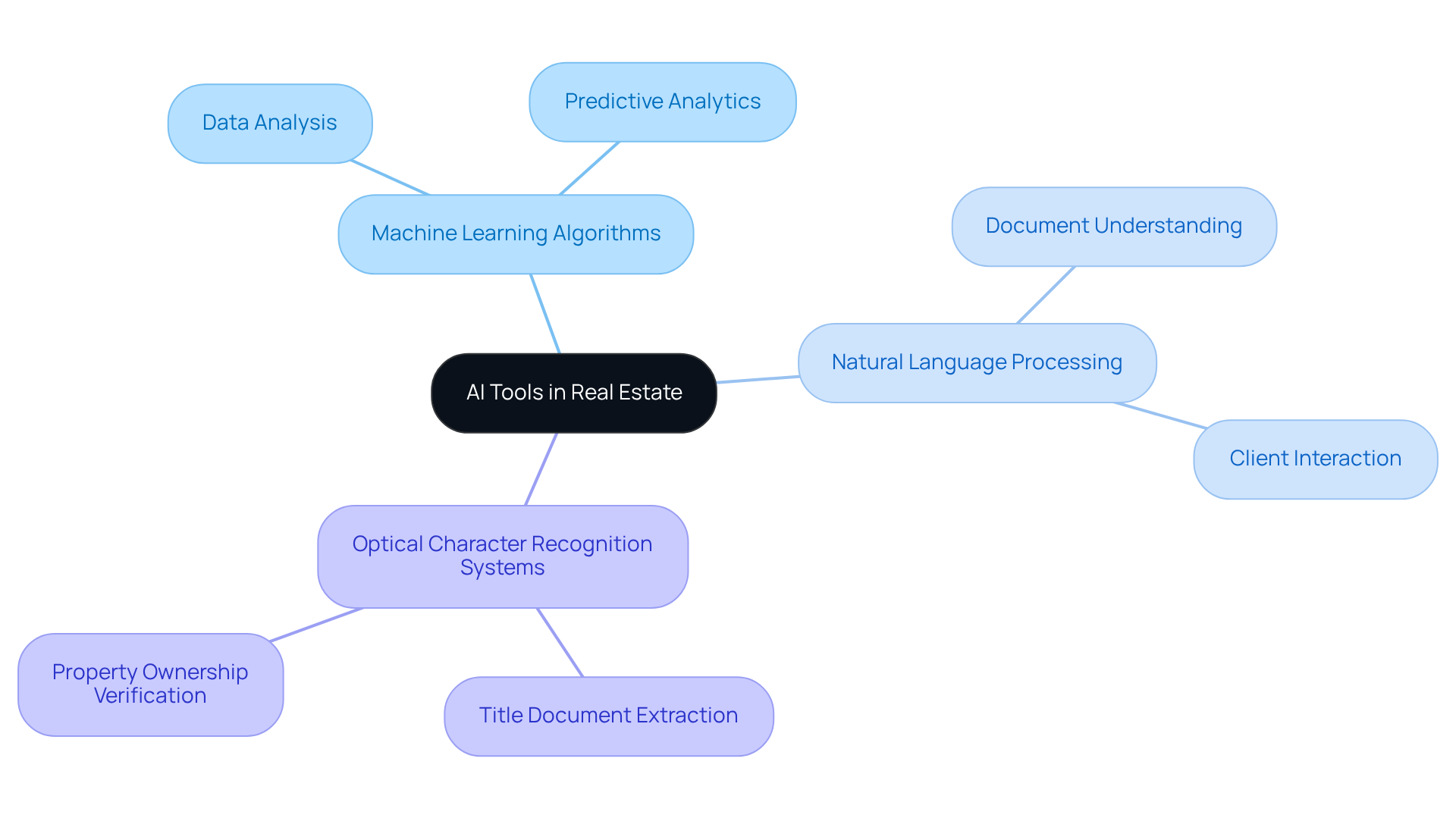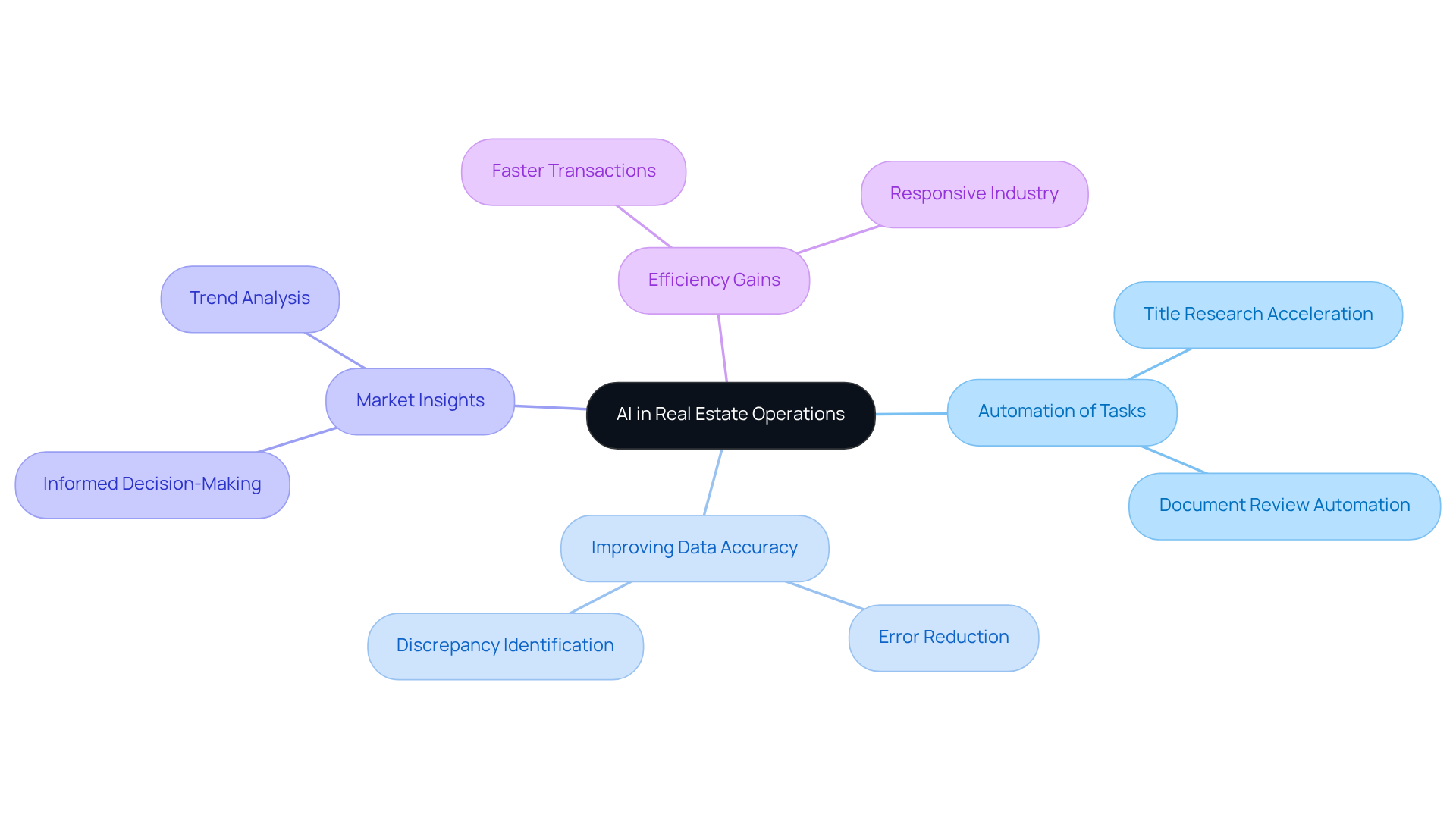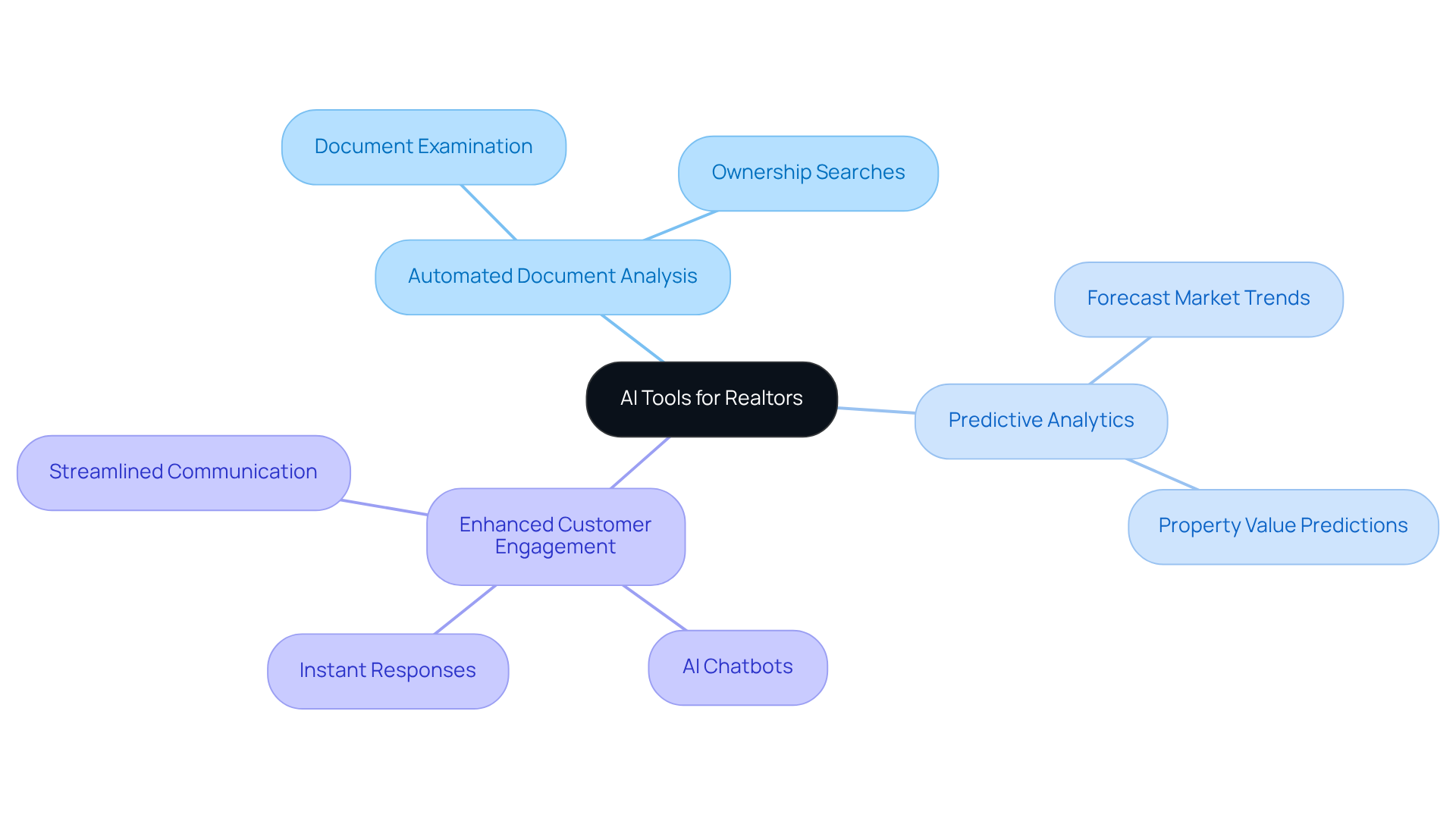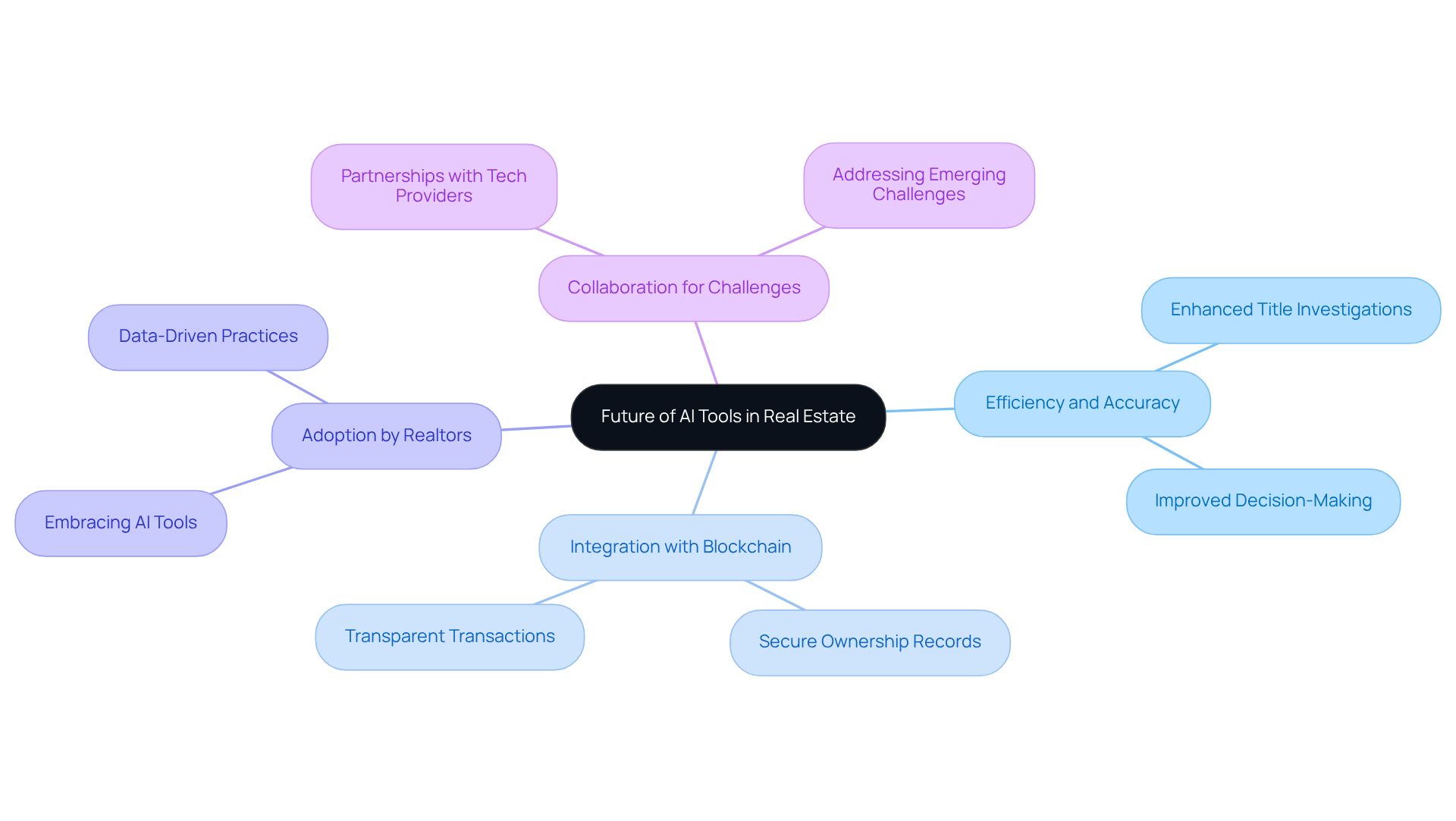Overview
Realtors are revolutionizing the efficiency of title research through the implementation of AI tools that automate document analysis, enhance data accuracy, and deliver real-time insights into market trends. The significance of accurate title research cannot be overstated, as it is foundational to the integrity of real estate transactions.
However, traditional methods often present challenges that hinder efficiency. Fortunately, these advancements streamline the ownership verification process, allowing realtors to concentrate on strategic decision-making. Consequently, this shift not only improves operational efficiency but also empowers professionals within the real estate industry to make informed choices that drive success.
Introduction
The integration of artificial intelligence in real estate is revolutionizing the approach property professionals take towards title research and operational efficiency. By leveraging advanced AI tools, realtors can automate tedious processes, enhance data accuracy, and make informed decisions faster than ever before.
Furthermore, as the industry embraces these technological advancements, critical questions arise:
- How will the evolving landscape of AI tools shape the future of real estate transactions?
- What challenges might emerge in this transition?
Addressing these questions is essential for understanding the full impact of AI on the real estate sector.
Define AI Tools in Real Estate
AI resources in real estate demonstrate how realtors use AI tools to leverage software and applications that automate processes, analyze data, and enhance decision-making. These tools include:
- Machine learning algorithms
- Natural language processing
- Optical character recognition systems
In the realm of title research, AI applications significantly streamline the extraction and analysis of information from title documents, thereby reducing the time and effort required for property ownership verification. By automating repetitive tasks, these solutions illustrate how realtors use AI tools to empower property professionals to focus on more strategic activities, ultimately improving overall operational efficiency.

Explore the Role of AI in Enhancing Real Estate Operations
AI plays a pivotal role in how realtors use AI tools to enhance their real estate operations. By automating time-consuming tasks, how realtors use AI tools can improve data accuracy and facilitate better decision-making. For instance, AI algorithms can swiftly examine large quantities of property documents, identifying discrepancies and potential issues that may arise during transactions. This capability not only accelerates the title research process but also diminishes the likelihood of errors, which can lead to costly delays.
Furthermore, the way how realtors use AI tools provides instantaneous insights into market trends and property values, empowering property professionals to make informed choices based on precise data. Consequently, the integration of AI into real estate operations fosters a more efficient and responsive industry.

Identify Key Applications of AI Tools for Realtors
Key applications demonstrate how realtors use AI tools for automated document analysis, predictive analytics, and enhanced customer engagement. AI-driven applications, for example, can automatically examine and extract crucial details from deed documents and property records. This capability significantly minimizes the time required for ownership searches. Furthermore, predictive analytics demonstrate how realtors use AI tools to forecast market trends and property values, enabling them to provide more effective advice to clients. In addition, AI chatbots enhance customer engagement by demonstrating how realtors use AI tools to deliver instant responses to inquiries, streamline communication, and improve client satisfaction. These applications illustrate how AI resources can transform the property landscape, making processes more efficient and client-oriented.

Examine the Future of AI Tools in Real Estate
The outlook for AI resources in property management is promising, as advancements in technology are expected to enhance efficiency and accuracy in title investigations and related activities. As machine learning algorithms evolve, they will analyze complex data sets with increased precision, leading to superior insights and decision-making capabilities.
Furthermore, the integration of AI with technologies like blockchain has the potential to transform property transactions by establishing secure and transparent ownership records. As property professionals increasingly embrace how realtors use AI tools, the industry is poised for a transition toward more data-driven practices, ultimately enhancing service delivery and client satisfaction.
The ongoing collaboration between technology providers and real estate professionals will be essential in tackling emerging challenges and maximizing the advantages of AI in this sector.

Conclusion
AI tools are revolutionizing the real estate industry by streamlining title research processes and enhancing operational efficiency. By automating tedious tasks and providing accurate data analysis, these technologies empower realtors to focus on strategic decision-making, ultimately transforming property transactions.
The integration of AI into real estate operations presents several key advantages:
- Machine learning algorithms analyze vast amounts of property documents.
- Predictive analytics forecast market trends, significantly reducing the time and effort required for title research.
- AI chatbots enhance client engagement by offering instant responses, showcasing how these tools elevate the overall customer experience in the real estate sector.
As the industry evolves, embracing AI technologies is crucial for realtors striving to remain competitive. By leveraging these advancements, real estate professionals can enhance their efficiency and deliver superior service to clients. The future of real estate is undoubtedly intertwined with AI, making it essential for stakeholders to adapt and harness the full potential of these innovative tools.
Frequently Asked Questions
What are AI tools in real estate?
AI tools in real estate are software and applications that automate processes, analyze data, and enhance decision-making for realtors.
What types of AI technologies are commonly used in real estate?
Common AI technologies used in real estate include machine learning algorithms, natural language processing, and optical character recognition systems.
How do AI applications benefit title research in real estate?
AI applications streamline the extraction and analysis of information from title documents, reducing the time and effort required for property ownership verification.
What is the impact of AI on the operational efficiency of realtors?
By automating repetitive tasks, AI tools empower property professionals to focus on more strategic activities, ultimately improving overall operational efficiency.




